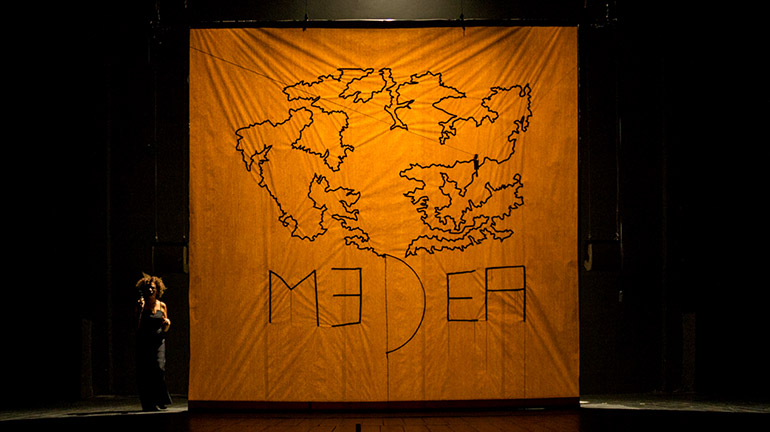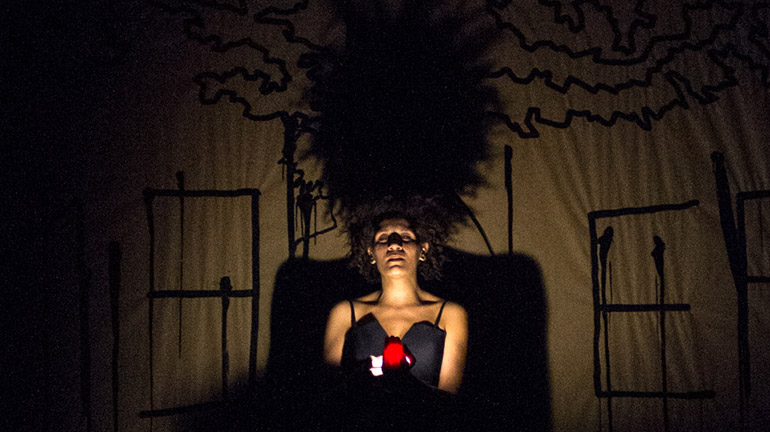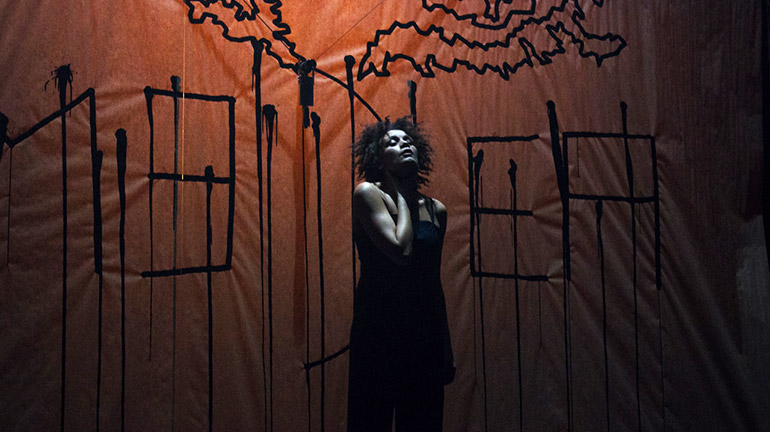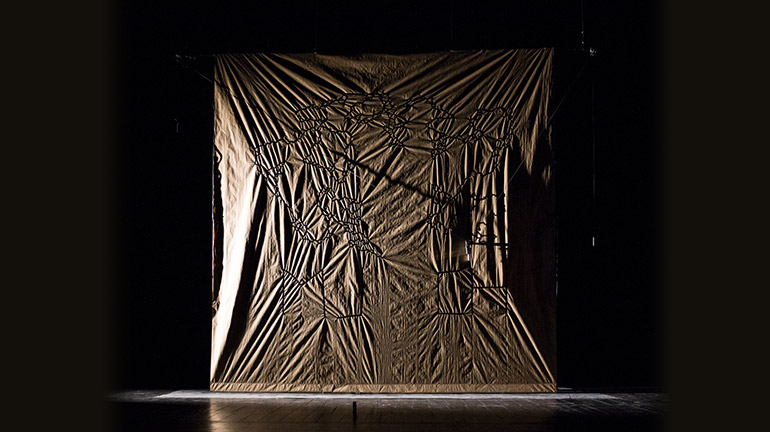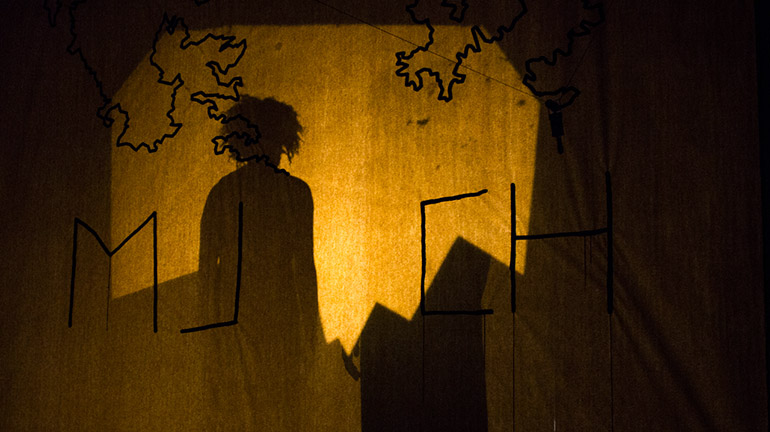de page
Médéa Mountains
Medea Mountains
Alima Hamel • Aurélien Bory • Charlotte Farcet
“When I returned to Médéa in Algeria to find my sisters whom I had not seen for 19 years, they asked me to tell our story. How to tell this story that only my song summons so much it escapes my comprehension? I have been singing about my sister’s death since 1997. An abstract song that has no words to pronounce as the violence seems indescribable. “Dead a violent death” wrote his medical examiner. Today, it’s time for me to question the memory of our family history, to write it with my ink, to say it, to sing it with urgency and the commitment of theater, the commitment to say what must finally be heard from a dark period in Algeria that the world does not yet have the means to analyze as it is so recent. That the Algerians themselves still immersed in this trauma observe in the most moving silence. A tribute to my sisters abandoned one after the other in the small mountain town of my parents, Médéa, in Algeria in the 80s, before the death by assassination of the youngest occurred in February 1997, surprised by the ” emergence” of the civil war of the 1990s. Few artists, men and women of letters born in Algeria, testified. I must contribute to this memory effort, as a French author and singer of Algerian origin. I want to talk to my family. I want to make Medea talk. Médéa, a small isolated town in the middle of the mountains, this “masterpiece of nature”, unknown to all, yet the cradle of the massacres of the Algerian black decade. »
Alima Hamel
March 2018
I have known Alima Hamel for many years, and I have been able to follow her beautiful musical journey, between jazz and improvised music or more precisely composed instantly. I was touched by his voice, the softness and harshness of which let me guess the uneasiness of his inner alchemy. I didn’t know anything about his family history. How I was able to ignore at the time the life of these young French girls, those who were my classmates in the 80s, condemned by their families to return to a country they did not know, with no other horizon than separation from their French life, isolation and marriage. Alima, who began to sing after the death of her sister returned to Algeria, today delivers an autobiographical text, whose family trauma in Médéa intersects with that of the Algerian black decade. I imagined a space for Médéa, which would not be a drawing, nor a geographical map, nor a machine, but all of these at the same time. A device as a guardian of a story, which would impose its unfolding, but would at the same time unravel the meanders of the memory of Alima, who no longer really knows how all this could have been possible, and who is looking beyond her story a meaning, but of its meaning there is none. “What about my story?” asked Perec. “History with its great ax has already done it for me. “Listening to Alima speak with her words of poetess, I thought that the story had not told us everything…
Aurélien Bory
March 2018
22 years ago, Dour died. I didn't say goodbye to her. For 22 years, her shadow has been there.
Alima Hamel
Back to the roots
In Médéa mountains we first hear Médéa, a small village in Algeria whose name seems to resonate with the cries of the most famous infanticidal mother in mythology. We also feel the blues of the mountains all around, of which Alima Hamel has taken up the trace, in the creolized sense of the path, between very real geography and the reinvented cartography of a memory that has become necessary. In an intimate device designed with Aurélien Bory, she sings and she says to herself. To testify. And to come back.
What remains in this new opus of the previous one presented a year ago at La Nouvelle Digue?
I don’t necessarily want to revisit the first draft. On the one hand it is over, it was a stage. On the other hand, this show had a long, triple gestation: first that of the events of my own life; then that of writing which helped me to give them meaning; and finally that of the creation itself, which allowed me to shape everything. Creation is also a slow process: all of this is done in parallel, intersects, plays together, sets traps for each other. So between last November and today, a lot of things have changed, the musician Fabrice Dang Van Nhan left the project, two composers joined me. I wanted to send sound, to work with electro music. At first I didn’t deliberately try to change everything, but over the months the show really became one on stage. As if I assumed better (and better and better) to carry it alone: Médéa Mountains today is my story, it is my word.
Did this reappropriation of your first word require reworking the text?
Yes, I completely reworked the text. I wanted it to be more narrative and poetic, less improvised, less “hidden” in automatic, spontaneous writing. I wanted to tell the story. All the story. Really tell. Without staying in the ellipsis. For the audience to understand. It forced me to do a lot of written production work and then to confront myself in a second time with writing for the set, which I had never done before. I have been writing poetry and songs for a long time, but this is very new because it is a story. The difficulty was therefore to move from poetry, where everything can be perceived between the lines, to orality and to a story that I play and that I address to the public. To make it understandable. And (hopefully) understood.
And to review your writing habits?
Necessarily. I have been working on this project for twenty years and depending on the state of progress in which it was, I had to modify, adapt my way of writing to stick as closely as possible to what I wanted to say. To reach the stage of the story I started by writing my memories over the water, without working on the style at all, it was quite horrible in the raw form. A “short breath” writing in which I then reinjected length, prose in some places, poetry in others. I work today in artistic collaboration with two perspectives, very active perspectives, which are those of Charlotte Farcet on the text, the dramaturgy and Aurélien Bory on the scenography, the staging. If I doubt I send them my texts, I feel they are very close to my work, communicating vessels by dint of discussions (laughs). They are precious and oblige me when necessary to clarify my thinking, my ideas.
You talk about doubt, how do you measure what you put in your shows when you are in touch with the intimate?
I have always worked on the intimate. Even before this project. From the start. In my way of taking over singing, starting from the most intimate base there is, in everyone: the voice, the breath. It was already like that in my songs, in my previous artistic collaborations, with Monkomarok, with Lone Kent. But there of course, there is the autobiographical dimension which totally involves me. Médéa mountains is the story of my family, my parents, my sisters, my little brother too in a way. This is my look, from start to finish. The audacity to say (oneself) is a big challenge. I stay in the first person throughout, but the violence is less direct than in the previous residency outing. In the meantime, I nurtured my project, I read a lot, I documented myself on the dark decade that began in Algeria from 1991. And then I investigated personally. I took steps in Médéa, where my sister was murdered and where my mother returned to live a few years ago.
Does writing have virtues of resilience?
It’s amazing how it revives the memory in any case. Magical the power of words: we start writing and forgotten things reappear. My base is singing, I always come back to improvisational singing, to the body, but singing and writing are inseparably linked. To combine the two is to find a coherence, a force, which will draw from different places in me. I need to sing in order to be able to write: singing is my structure, my landmark, but I’m leaving it little by little to go towards saying it. My balance is between those two things.
Interview by Cécile Brochard From January 15 to 18, 2019 at the Sorano Theater
DISTRIBUTION
With Alima Hamel
Conception, text, performance Alima Hamel
Scenography, direction Aurélien Bory
Dramaturgy, artistic collaboration Charlotte Farcet
Music and sound composition Adrien Maury
Light design Arno Veyrat
Costumes Manuela Agnesini
Technical Director Thomas Dupeyron
Sound manager Adrien Maury
Stage manager Stéphane Chipeaux-Dardé
Light manager Arno Veyrat or Didier Barreau
PRODUCTION Compagnie 111 – Aurélien Bory
COPRODUCTION Théâtre Sorano – Toulouse
REHEARSALS AND RESIDENCIES Théâtre de la Digue – Toulouse, Théâtre Sorano – Toulouse
This show received creative support from Conseil Départemental de la Haute-Garonne and Région Occitanie / Pyrénées-Méditerranée



